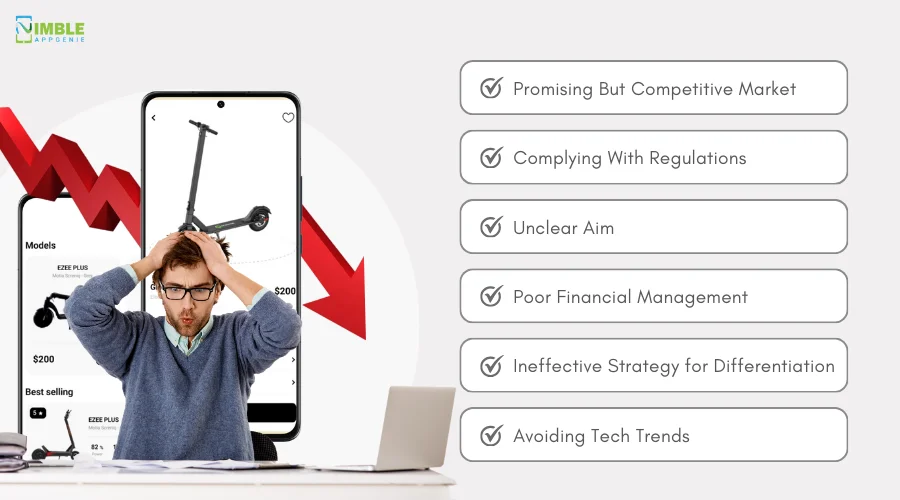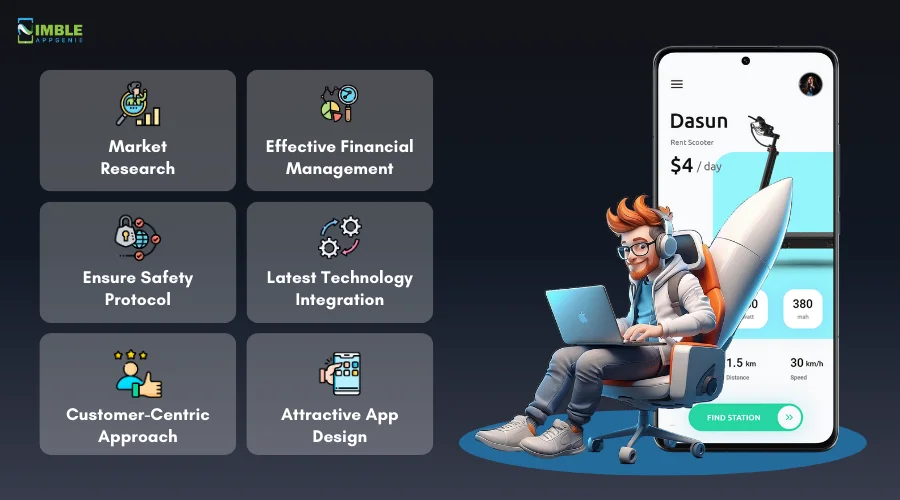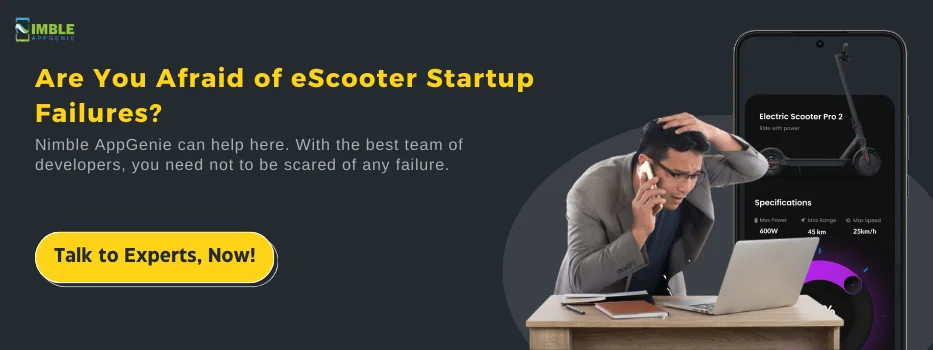Before going on the road of developing an e-scooter app, you should know the rate of their failures.
What is the rate of failure in e-scooter startups and what are the key lessons to learn from them?
Here you will find the list of e-scooter start-ups that failed, lessons to learn from them, and how top apps are leading the world.
Let’s begin the journey.
List of e-Scooter Startups that Failed
Why E-Scooter Startups failed?
Before answering it, do you want to know how many eScooter startups have lost their way to success?
Well, a list can help you with the errors most of the eScooter startups performed that forced them to shut down.
Here are the case studies of eScooters startup failures.
1. Unicorn
Unicorn was a Texas-based enterprise that seemed to have everything needed to succeed as a business including a Y combinatory, an experienced founder, and an effective planned strategy. The CEO of the company stated that they blew all their funding on advertisements and loan repayments, learn more.
Reasons for Failure
- Poor financial management
- Lack of Operation management
- Lost focus on the objective
- Unmet needs of target users
2. Skip
At the early stage, Skip initiated its service as a flexible last-mile solution for people. This company worked with the cities to ensure that fleets were operated with the support of the surrounding communities. The company failed to survive because of certain points, let’s learn them.
Reasons for Failure
- Regulatory Issues
- Lack of financial management
- Criticized for cluttering public places
- Outdated Technology
3. Gotcha
Gotcha started as an electric scooter bike and sharing organization which is based in South Carolina. The company started its services at college campuses and later expanded as a scooter-sharing business. However, this eScooter startup failed due to several reasons.
Reasons for Failure
- Financial management issues
- Acquisition-related challenges
- High Competition
- Lack of targeted audience
4. Coup
Coup has operated in Berlin, Paris, and Madrid with around 5000 fleets. With the latest functionality and features, the startup has served people successfully. However, in 2019, the company discontinued its operations in all three cities. Let’s learn the reasons for its failure.
Reasons for Failure
- Competitive and challenging market conditions
- Ineffective economic model
- High competition
- Regulatory challenges
5. Ofo
Ofo become one of the first non-docking eScooter sharing platforms that assist the riders to use the simple transportation service successfully. They get a password that helps to unlock the bike and eScooters that mitigate the aspect of the QR scanning system. But, what made them withdraw services?
Reasons for Failure
- Operational Difficulties
- Poor financial management
- Unsustainable infrastructure
- Lack of strategic planning
6. Scoot
Scoot which is also named Scoot Networks or Scoot Rides provides public electric scooters and an electric bicycle sharing system. One of the major issues that the company is facing is raising sufficient funds to remain competitive.
Reasons for Failure
- Operational Difficulties
- Lack of focus on operations
- High Competition
- Regulatory challenges
7. Yugo
Yugo is a Barcelona-based eScooter startup that has a fleet of 210 silent and also has a large range of 20,000 community users. It has sufficient crowd funding to continue with the company’s growth. Although, there are several reasons for its failure.
Reasons for Failure
- Market Competition
- Unable to capture the target audience
- Operational and regulatory challenges
- Poor financial management
These were some of the case studies that you should follow to learn lessons from eScooter startup failures.
Let’s study these reasons in detail within the following section.
Common Reasons for e-Scooter Startup Failure
We have already discussed the eScooter startup failures and why they have failed.
However, if you wish to learn the reasons behind e-scooter startup failure in detail, then this section should be considered.
Kindly go through the list below.

♦ Promising But Competitive Market
When you draw the insights from eScooter statistics, the market is promising and can provide you with unexpected profits.
On the other hand, it is uncertain and there are already many existing brands that can make your eScooter startup existence challenging.
Along with this, too high-markup prices can enhance the risk of the competitive industry. This can make the entry difficult and may impact the overall development cost of an e-scooter app.
♦ Complying With Regulations
Within the list of eScooter startup failures, you might have noticed that there are companies that have failed because they were unable to comply with the regulations.
Now, let’s learn what does this mean. Complying with the laws is essential to establishing and running a business based on government parameters, rules, and restrictions.
Several of the eScooter startups that failed aren’t able to fulfill the parameters made by the cities or states related to ride-sharing services.
♦ Unclear Aim
Sometimes the unclear aim and objective to begin with the app development process can result in losing the complete business.
Apps with a lack of objective can result in confusion and conflicts among the team members that can impact the overall business.
Hence, it can be stated that a lack of clear direction cannot lead to achieving the defined goal effectively.
♦ Poor Financial Management
Lack of financial management is one of the major barriers to developing an eScooter app and majority of the businesses fail because of this issue.
Inadequate cash flows or overspending on marketing can become one of the severe issues that can increase financial errors along with operations mismanagement.
If you have an unplanned or inadequate fundraising strategy it can become an issue in the future. This is why the majority of the eScooter startups have failed.
♦ Ineffective Strategy for Differentiation
In the competitive landscape of the eScooter rental-sharing industry, if your service doesn’t offer any unique parameter then it is useless.
There should be a point of differentiation that can increase the service presence in the market. Innovating and creating the app should be a way to scale up a competitive edge.
If the app users can’t differentiate between your service and that of the competitors, then there are high chances of your eScooter startup failure.
♦ Avoiding the Implementation of Latest Technology
Are you avoiding the implementation of the latest technologies during the development of an eScooter mobile app?
Well, then this is among the mistakes to avoid while developing an eScooter app. It can make your app outdated and can affect the overall performance.
You should be aware of the latest tech stack implementation and need to adopt it successfully to sustain the competition. This is one of the crucial learnings from failed e-scooter startups.
These were some of the common business lessons from failed electric scooter startups to learn. Now, as we completely learn about failures, let us learn what makes popular eScooter apps succeed.
How Do the Top e-scooter Startups Succeed?
Well, we discussed failed e-scooter startups and their related learnings.
Now, have you thought of how the top eScooter apps leading the world?
Let’s study them all here.
A] Lime
Lime has succeeded in the eScooter startup race due to its ability to deliver a unique quality of service to users. One of the attributes that led this company to success is its spirit to make differentiation within its services. They started to build their e-scooters to make a difference.
Reasons for Success
- Effective Operation Management
- Service Differentiation
- Strategic Planning
- Quick and quality service
B] Bird
Bird Electric Scooters offers a rental service which was launched in 2018. It was especially started to provide eco-friendly transportation services for the riders in the hundreds of cities. The user interface of the Bird app keeps users engaged and is a major reason behind their success.
Reasons for Success
- User-friendliness model
- Up-to-date pricing information
- Effective App’s User Interface
- Implementation of current market trend
Also Read: How Much Does It Cost to Develop an App Like Bird?
C] Goat
Goat empowers local operators and brings dockless eScooters to locations, where transportation is an issue and larger ride enterprises don’t provide their services. This startup was designed to make city transportation services easier and user-friendly.
Reasons for Success
- User-centric startup business design
- Strong local partnerships
- Engaging app features and functionalities
- Adaptive latest technological integration
D] Yango Wind
Wind eScooter startup provides a keyless and hustle-free service through their app. They offer dock-free rental services for short-distance urban trips. It is considered a most successful app with a high level of service quality.
Reasons for Success
- Latest technological adoption
- User-centric model
- Quality Service
- Engaging app features
E] Lyft
To lend Lyft eScooters all users need is an app. Lyft offers an interactive user interface in their apps that increases engagement. This service completely focuses on ensuring that the users receive quality services based on their demand.
Reasons for Success
- Innovative features and services
- Focus on customer service
- User-friendly interface
- Use of the latest technologies
F] Dott
With the Dott app, users just need to sign up to have a free ride through traffic jams. The vehicle color is bright which attracts many of the users. These scooters are available 24/7 to provide a quick service to the users in need.
Reasons for Success
- Sustainable robust technologies
- Efficient operations and management
- Adaptable to current technologies
- User-friendly interface
G] Neuron
Neuron provides a nearby eScooter ride-sharing service to its users through its interactive app focuses on fulfilling users’ demands. The company has established itself as a reputed business with an array of safety regulations.
Reasons for Success
- Advance technology integration
- Commitment to Safety
- User-centric research
- Strict regulatory compliance
These were some of the top eScooter startups that have achieved success. Now you can learn lessons from them and implement them to reduce the risk of eScooter startup failures.
Now, what’s next?
Successful Ways to Avoid Failure in e-Scooter Startups
Well, we have one more step for you to make your eScooter startup competitive enough to achieve success.
Here are certain tips and successful ways to avoid failure in eScooter startups.

► Market Research
Market research is an important parameter where you should identify about eScooter industry and learn its nuances.
A study about the current eScooter trend can help you here to analyze present market conditions.
► Effective Financial Management
You should prepare a detailed financial management plan that comprises cost, maintenance, and marketing and also ensures that there is enough capital to cover the expenses.
Here you should monitor daily expenses closely to look for several ways to reduce cost without compromising any quality.
► Ensure Safety Protocol
Safety should be your prime motive to be considered for eScooters. It helps in enhancing users’ trust in the app.
You should implement mobile app security to protect user’s data from theft or any breach. Along with this, you should add safety regulations in the app to drive scooters.
► Latest Technology Integration
Integration to the latest technology usage is essential for providing users with an updated interface with the latest tech stack.
You can make use of IoT and AI in eScooter apps to increase their potential to address users’ changing demands.
► Implication of Customer-Centric Approach
Customer-centric approach completely focuses on users’ needs and how they want to interact with the eScooter startup.
You can implement the feedback mechanism for ensuring to have resources and infrastructure to support the startup growth.
► Attractive App Design
Users often get bored by using the same features and app, thus you should adopt effective UI/UX design to keep them engaged over time.
eScooter app design should be developed based on users’ preferences and how they want to use the features.
These are some of the features that you can adopt and implement to reach out to the users successfully and attain a competitive edge in the market.
Partner With Nimble AppGenie to Initiate Your eScooter Startup
A team that listens to all your needs and is able to design a roadmap to lead the eScooter market through an app, is priceless.
Nimble AppGenie is the best eScooter App Development Company that can enable you to reach the targeted users.
With a panel of experts you can discuss your dream app requirements and we will help you to attain a competitive edge.
Conclusion
In the way of success, ups and downs build our path. Similarly, if you want to want to have your own eScooter startup, learn lessons from failures. eScooter startup failures include apps such as Skip, Unicorn, Gotcha, and others that have failed due to many reasons.
It’s an opportunity to learn from these startups and prepare an inspiring strategy to lead the market. Lessons to learn from eScooter startups’ failures are the implementation of the latest technology, preparation of effective strategies for differentiation, and others.
A team with the latest competitive skills can help you to include these elements in your eScooter app to protect you from failure.
FAQs
The failure rate in e-scooter startups is relatively high due to various challenges such as financial mismanagement, regulatory issues, and intense market competition. Understanding these failure rates can help new startups prepare better strategies for success.
Unicorn, a Texas-based e-scooter startup, failed primarily due to poor financial management. The company spent all its funding on advertisements and loan repayments, which led to operational and financial instability.
Skip failed due to regulatory issues, lack of financial management, criticism for cluttering public places, and the use of outdated technology. Despite working closely with cities, these challenges proved insurmountable for the company.
Gotcha failed because of financial management issues, acquisition-related challenges, high competition, and a lack of a targeted audience. The company’s inability to address these problems led to its downfall.
The Coup’s failure can be attributed to competitive market conditions, an ineffective economic model, high competition, and regulatory challenges. Startups can learn the importance of having a sustainable business model and staying compliant with local regulations from Coup’s experience.
To avoid failure, new e-scooter startups should focus on effective financial management, robust safety protocols, compliance with regulations, market research, customer-centric approaches, and the integration of the latest technologies. Implementing these strategies can help startups overcome common pitfalls and achieve success.

Niketan Sharma is the CTO of Nimble AppGenie, a prominent website and mobile app development company in the USA that is delivering excellence with a commitment to boosting business growth & maximizing customer satisfaction. He is a highly motivated individual who helps SMEs and startups grow in this dynamic market with the latest technology and innovation.
Table of Contents






No Comments
Comments are closed.